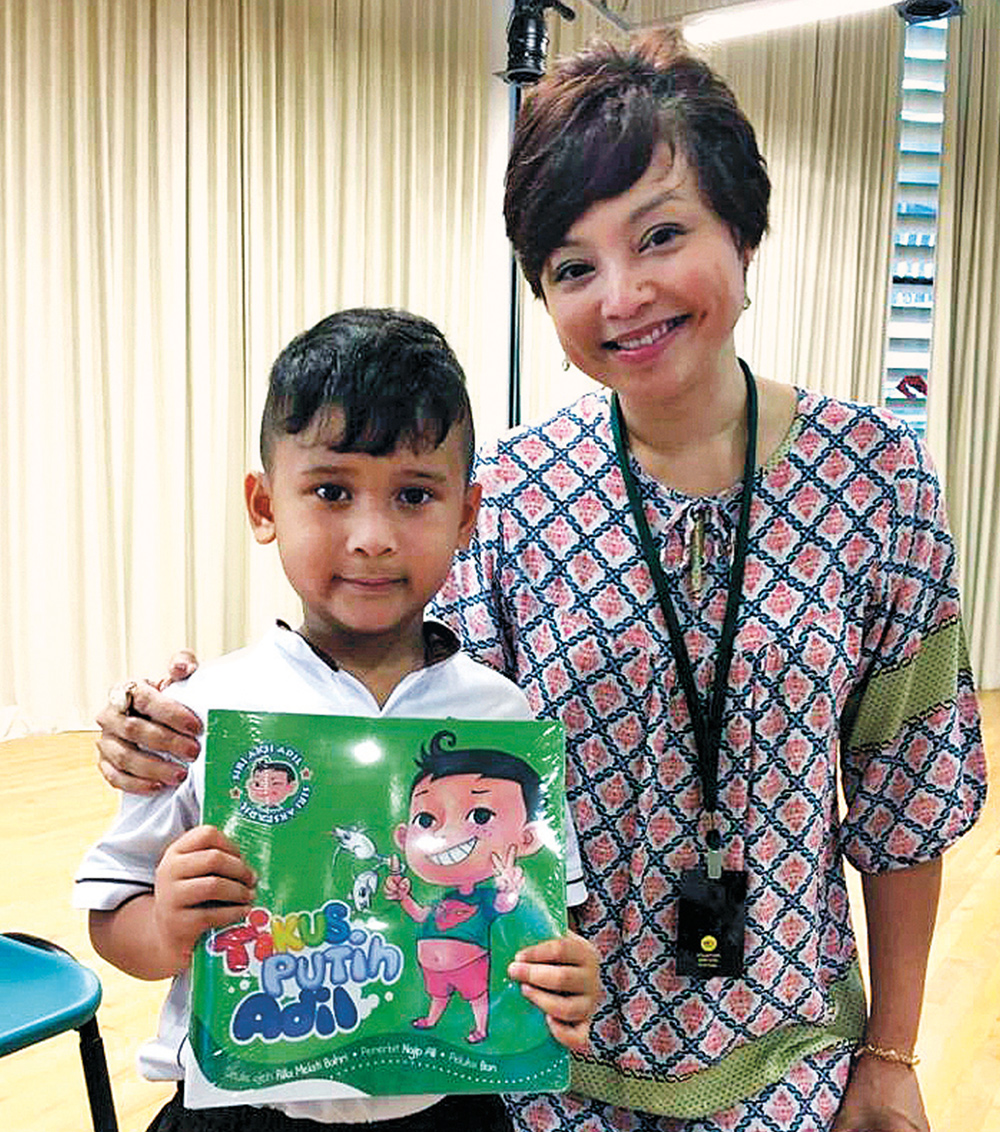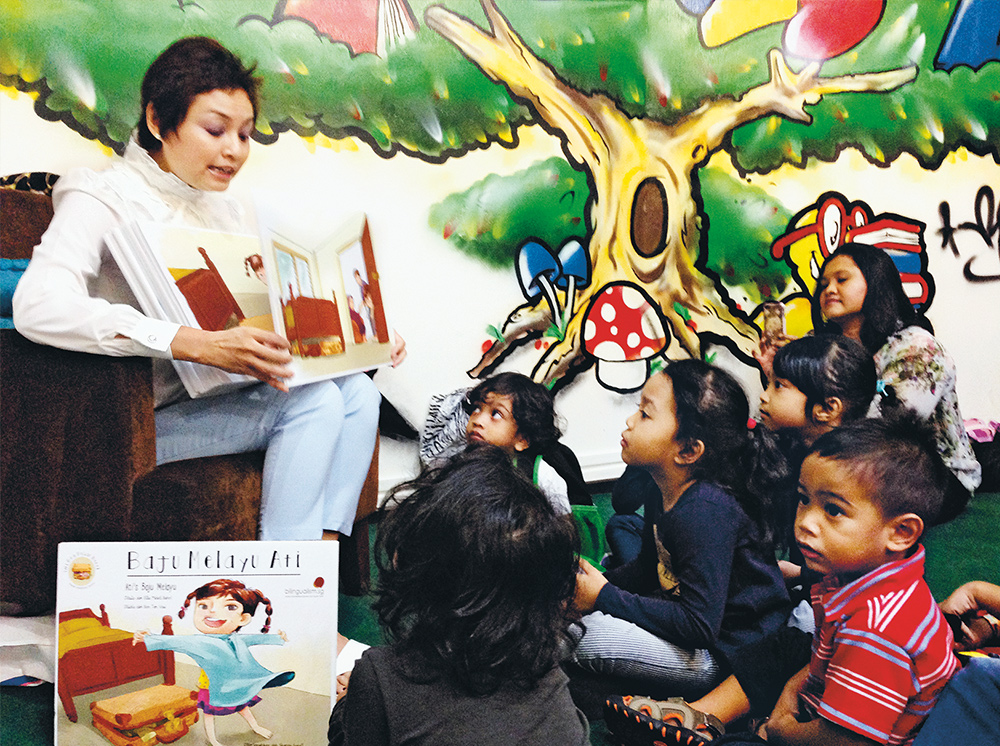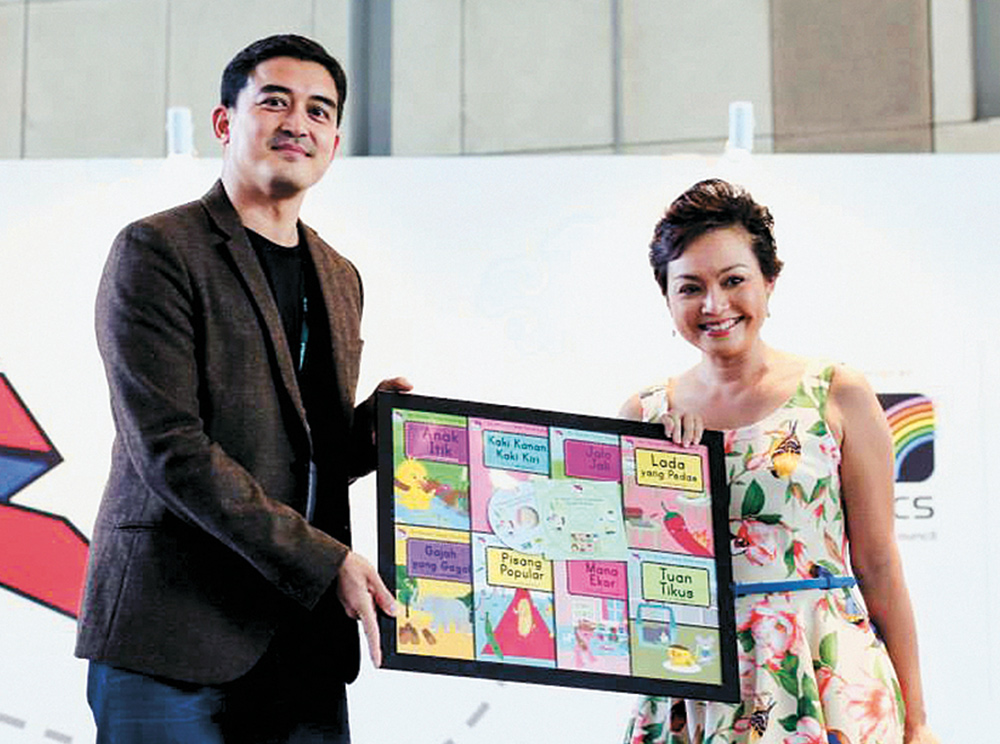Mind Your Language
Education entrepreneur Ms Rilla Melati (Arts and Social Sciences ’96) is reimagining the way Malay is learnt.
WHO SHE IS
Ms Rilla Melati is a pioneer of Malay speech and drama programmes for schools in Singapore, and the founder of Mini Monsters, which reinvents the way the language is learnt. She is also a popular author of several Malay and bilingual children’s storybooks and has written scripts for many Malay children’s TV shows since the 1990s. Her name might ring a bell for children who grew up in the 1980s. That’s because she was a cast member of one of local television’s most popular children’s shows, Aksi Mat Yoyo.
Ms Rilla's prowess as a storyteller comes to life as she describes her childhood in the 1980s. “I was surrounded by the Malay language. It was on the radio, on television, in my books,” the 48-year-old recalls, adding that she spoke nothing but Malay at home. These conditions led to a lifelong love and passion for the Malay language.
Four decades on, she observes that a similar passion for the language is missing in today’s youths. “To them, Malay has become just a ‘Mother Tongue Language’ — something they learn in school for the sake of exams,” she explains. “Regrettably, there is no longer a visceral connection to the language.” When asked about the reasons for this change, she points to the general lack of creative local Malay content that is age-appropriate and a curriculum that used to focus too heavily on the technical aspects of the language. “Compare this to when I was a kid — it’s completely different now. Now it’s something you score in, not something you speak in.”
 The first of two storybooks that Ms Rilla wrote with a bilingual glossary that is used in Mini Monsters’ Malay speech and drama programmes in schools. It was also Mini Monsters’ maiden publication.
The first of two storybooks that Ms Rilla wrote with a bilingual glossary that is used in Mini Monsters’ Malay speech and drama programmes in schools. It was also Mini Monsters’ maiden publication.
VALUABLE LESSONS
These are the things that Ms Rilla is trying to change with Mini Monsters, an educational venture that is charting new learning strategies to help young ones — and the young at heart — learn and relearn the Malay language. It does this through a popular enrichment programme for schools, where Ms Rilla and her team enliven the learning of the language through music and movement, drama and locally-authored storybooks. “These are things I learnt as a member of the inaugural batch of NUS Theatre Studies, and they are very powerful tools,” she explains, adding that they can be used across all age groups and proficiency levels.
It’s something she knows very well herself — as a child, she was a cast member of the popular
Aksi Mat Yoyo television show, which ran from 1982 to 1992. Recalling those days of early fame, she says, “My weekends were spent on the show. I remember going to Caldecott Hill before the sun rose and then leaving only after it had set.” Still, the hard work was worth it as she was able to learn from the greats of Malay entertainment at the time, including Nona Asiah, a Cultural Medallion winner and mother of the late Iskandar Ismail, himself a Cultural Medallion winner. “It was the perfect blend of entertainment and education.”
That’s precisely what Ms Rilla hopes to do with Mini Monsters. Starting the venture was also a way of instilling in her son, now 20, the same appreciation for and comfort with the Malay language that she enjoys. “Some of the learning materials he had in school were very foreign to him because they were imported from the region. The main characters in the stories had errands like feeding the chicken or goat — which would not make much sense to a student in Singapore! So when children can’t relate, they tend to tune out.”
![]()
Malay has become just a ‘Mother Tongue Language’— something [kids] learn in school for the sake of exams. Regrettably, there is no longer a visceral connection to the language.
SUCCESS WITH ADIL
Realising that there was a dearth of localised Malay content, Ms Rilla decided to take the plunge and make Mini Monsters a publisher as well. After this, she began writing a series of books in the Malay language, known as the
Siri Aksi Adil (Adventures of Adil) collection. Loosely based on her son, the series follows the adventures of Adil, an inquisitive five-year-old Singaporean Malay boy, along with his friends and family. It also teaches the values of tolerance and acceptance, by suggesting that Adil lives in a single-parent household — and is no less loved because of it. It’s a theme that draws on Ms Rilla’s own experience as a single parent. “I want kids who may be in such situations to know that it’s okay.”
 Ms Rilla doing a reading of Baju Melayu Ati, one of two bilingual books which was a pioneer recipient of the Lee Kuan Yew Bilingualism grant in 2010, also published by Mini Monsters.
Ms Rilla doing a reading of Baju Melayu Ati, one of two bilingual books which was a pioneer recipient of the Lee Kuan Yew Bilingualism grant in 2010, also published by Mini Monsters.
ALL IN THE FAMILY

Language is a shared passion for Ms Rilla’s family, who live in different units in the same HDB block. Ms Rilla read to her son every night till he was about 12, choosing both English and Malay books. This bode well for him when he topped his school in the Malay language paper at the PSLE preliminary examination and his IB exams at St. Joseph’s Institution (SJI) in 2019. He was also named Best Speaker in the preliminary rounds for the tertiary-level National Malay Debate (Bahas 4PM) in 2019 when SJI emerged as the champion team.
 Rilla and her Siri Bacaan Cekap Kanak-Kanak (Confident Reader Series) at its launch at the Asian Festival of Children’s Content 2015.
Rilla and her Siri Bacaan Cekap Kanak-Kanak (Confident Reader Series) at its launch at the Asian Festival of Children’s Content 2015.
Alongside this, Ms Rilla never loses sight of her goal of fostering a greater appreciation for the Malay language. Each title in the
Adil series ends with a bilingual Malay-English glossary. In her words, she wants this to be “an entry point for children who might be distant from their mother tongue to appreciate and understand the Malay language better”. And the series has been recognised for doing just that: in 2018,
Payung Datuk Adil (Adil’s Grandfather’s Umbrella) won the National Arts Council’s
Anugerah Persuratan (Malay Literary Award) for Children’s Literature. She credits her parents for the win, especially her father, who was a Malay language teacher for more than 40 years. “He was my editor and helped me go through draft after draft, making it better each time.”
The success of Mini Monsters is apparent from its rapid growth, both in terms of size and services. More than a decade ago, Mini Monsters started out as a two-person, two-table set-up for an educational outreach arm of a television production company. Today, it has expanded to include a junior academy – Mini Uni; as well as MonstarsTV — a bilingual children’s digital portal. Mini Monsters has also grown from being a provider of Malay enrichment programmes to schools, to a leading bilingual Malay-English edutainment institution recognised for producing high-quality educational materials with the perfect mix of cross-media engagement for its young audience. To Ms Rilla, this expansion was a way of ensuring the longevity of her vision. “If we were too small, we wouldn’t be able to go where we want to go and keep doing it for years to come. That’s why the expansion was important.”